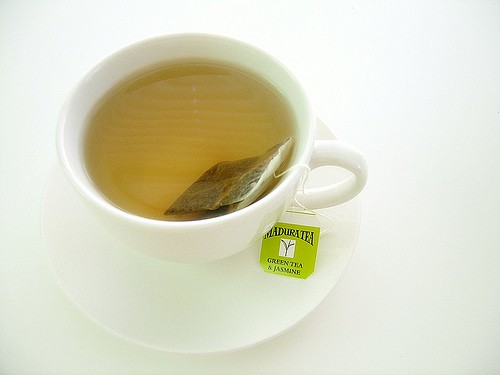
Drinking green tea regularly can interfere with the proper functioning of certain medications used to manage blood pressure, researchers reveal.
Nadolol, a drug commonly used to treat high blood pressure, was found to be less effective in patients who took green tea daily, Daily Mail reported. Nadolol, which is a beta blocker, reduces blood pressure by relaxing blood vessels, slowing the heart rate and thus boosting blood flow.
Green tea, a native to China, is made from a particular species of plant known as camellia sinensis. Highly known for its antioxidant elements, it has become one of the most popular beverages around the world. Both experts and many studies have highlighted the health benefits of taking green tea regularly, particularly its ability to fight cardiovascular diseases or protect against cancer and Alzheimer's disease. It is also used to treat gum disease and genital warts.
In the new study, ten healthy men and women took 30 mg of nadolol daily for two weeks, after drinking either three cups of green tea or water. Results showed that green tea placed some restriction on the amount of the medication being transported to the bloodstream from the gut. People who took green tea had 76 percent lower levels of the drug compared to the water drinking group, Health Day reported.
Shingen Misaka and colleagues from the Fukushima Medical University in Japan recommended patients following a nadolol medication to completely avoid green tea. While talking about their study, researchers said that green tea can have similar effects on the hay fever drug fexofenadine as well. Apart from that, too much green tea can also reduce the effect of another beta blocker called celiprolol, but not bisoprolol and atenolol.
Findings of the study have been published in the journal Clinical Pharmacology & Therapeutics.
Similar to the current study, the U.S. Food and DRUG Administration, cautioned last November that mixing grapefruit juice with certain prescription medications can escalate the risk of the drug to stay longer in the body, further increasing the risk of an organ damage or failure. Cholesterol (Zocor, Lipitor, Pravachol) and blood pressure lowering medicines (Nifediac, Afeditab), anti-anxiety (BuSpar) and arrhythmia drugs (Cordarone and Nexterone), organ transplant rejection drugs (Sandimmune and Neoral) and antihistamines (Allegra) were some of the drugs affected by consumption of grapefruit.
















